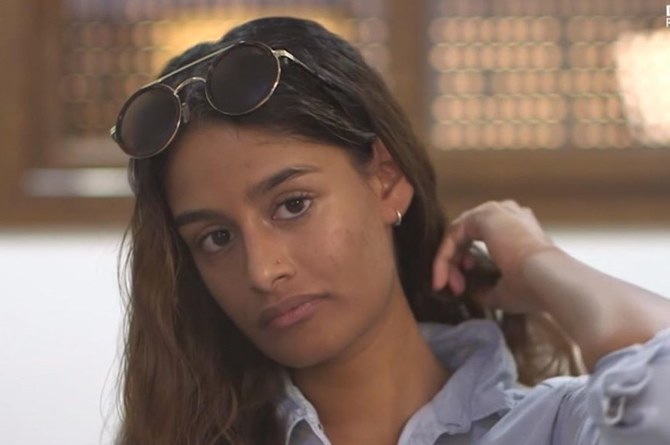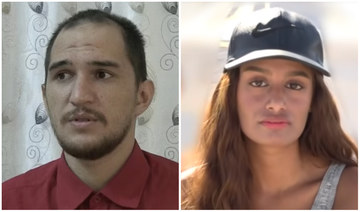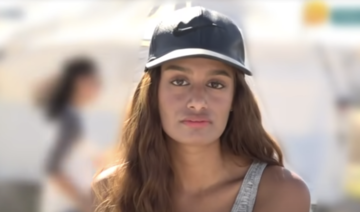LONDON: Shamima Begum has acknowledged that she joined a terror group but said that she is “just so much more than Daesh.”
Giving her first full account of her flight to Syria, she told The BBC podcast “The Shamima Begum Story” that she had been “relieved” to make it out of the UK and said that when she left, she expected never to return.
Begum said she knows the public now sees her “as a danger, as a risk, as a potential risk to them, to their safety, to their way of living.”
But she said: “I’m not this person that they think I am.”
Now the 23-year-old — who had three children in Syria, all of whom died — is in a legal battle with the British government to try to have her citizenship restored so she can return to London.
The tribunal hearing has centered on whether she was a victim of trafficking for sexual exploitation or a committed Daesh volunteer who is a threat to the UK.
Acknowledging that the public sees her as a potential danger if she should return, Begum said she is “not a bad person” and blamed the media for her portrayal. She said: “I’m so much more than everything I’ve been through.”
Does she understand society’s anger toward her? “Yes, I do understand,” she said.
“But I don’t think it’s actually toward me. I think it’s toward Daesh. When they think of Daesh they think of me because I’ve been put on the media so much.”
Challenged that the media coverage was a consequence of her decision to join Daesh, she said: “But what was there to obsess over? We went to Daesh, that was it, it was over, it was over and done with. What more is there to say?
“They just wanted to continue the story because it was a story, it was the big story.”
Pressed further on whether she accepts that she did join a terror group, she said: “Yes, I did.”
Tim Loughton, former children’s minister, told the BBC it was still not clear why Begum joined Daesh as a teenager and “what forces brainwashed her,” but he said public sympathy for her when she first went missing had increasingly been replaced by anger.
He said many people were justifiably suspicious that she was now “putting on act” in appearing to “transition from a heavily veiled Muslim young woman to somebody wearing Western clothes” as if she had “stayed in east London as a normal British teenager.”
He added: “I think most people will say that, frankly, we owe her nothing. She got herself into this mess and frankly it’s down to her to work out how she’s going to get out of it.”
According to Begum’s account, the preparation for her and two other girls from Bethnal Green to join Daesh in Raqqa involved their own research as well as explicit instructions from the terror group’s members. One of the girls later died and the other is also believed to have been killed in Syria.
Begum said there were “people online telling us and, like, advising us on what to do and what not to do,” with “a long list of detailed instructions,” including what cover story to use if they were caught.
Tasnime Akunjee, a lawyer who represented the families of the girls, told the BBC that he searched their rooms after they fled, looking for clues: receipts, phone bills, texts, emails.
“I’ve never seen anything so thoroughly dry-cleaned of evidence or information as these young teenagers managed to do themselves,” said Akunjee, a criminal lawyer with 20 years of experience. “They must have had a great deal of trust in whoever it is that they were speaking to, to follow that, to follow their advice very, very carefully.”
He said just one scrap of paper was found in Begum’s house. It was a shopping list, detailing items they would need for their trip to the Daesh caliphate and how much they cost — a phone for £75 ($90), socks for £4, taxi for £100 — with a name or an initial of one of the girls next to each.
Begum denied the list was hers, saying it had been left by Amira, one of the other girls.
“We tried so hard to clear up our tracks and just one of us was stupid,” she said.
Begum said they tried to pack light for the journey, though she was advised to “pack nice clothes so you can dress nicely for your husband,” referring to the fact that they were expected to marry Daesh fighters.
While they showed sophistication in concealing their intentions to join Daesh, other aspects of their planning betrayed the age of the teenage runaways.
Begum said she stocked up with chocolate bars that she knew she would not be able to buy in Syria: “about 30” mint Aero bars.
“You can find a lot of things in this country, but you cannot find mint chocolate,” she said.
One woman who went to school with Begum said she had been “a ghost” who was quiet and kept to a small friendship group.
Begum says her family thought she was “weak to do something so crazy” and “did not think in a million years” that she could be recruited by Daesh.
“I’ve always been a more secluded person. That’s why it’s so hard the way my life has turned out being all over the media because I’m not a person that likes a lot of attention on me,” she told The BBC.














